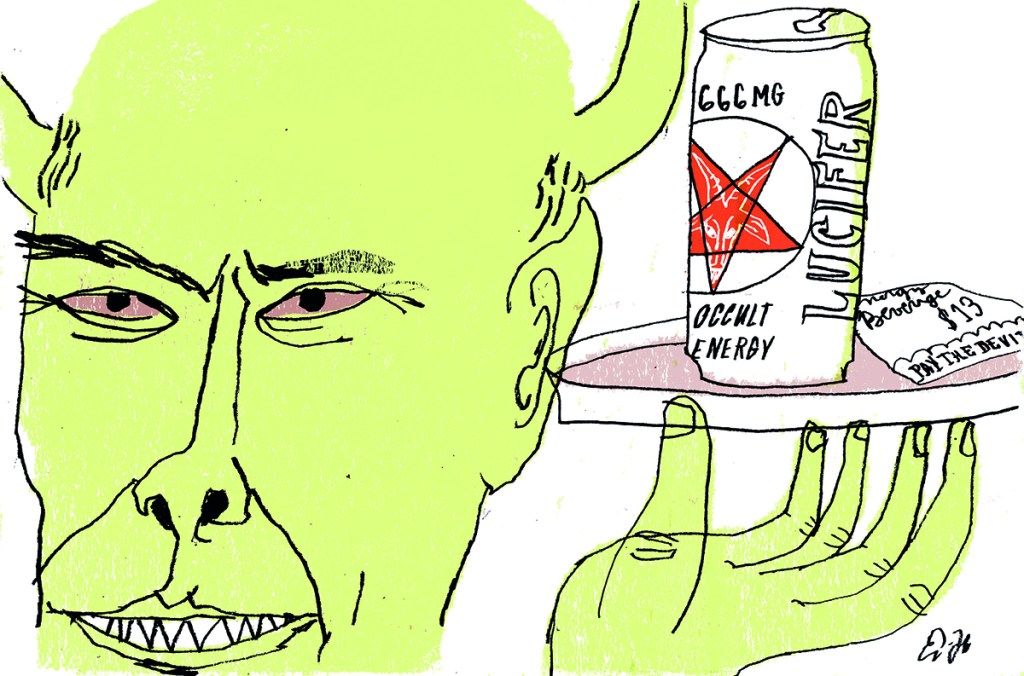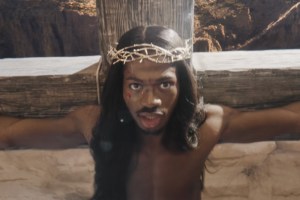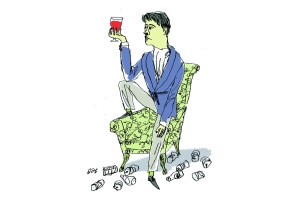I’m trying to cut down on energy drinks. I know, that’s a rather pathetic undertaking compared to going sober or quitting smoking. But it is hard. I wade through mental fog, yawning yawns that rival a buffalo’s bellow. Switch to coffee? Yes, I could. But hot drinks are not the same. I like the cold, refreshing quality — and the ring pull’s crack.
Perhaps I will give up giving up and just embrace addiction. It’s a small one anyway. That is my defense, but also my confession. We can understand, if not excuse, people endangering their health for the sake of alcohol or cigarettes — but for a caffeinated soft drink?
Or perhaps there are darker forces at play here. In a 2014 video, Christian evangelical Christine Weick memorably claimed that Monster Energy drinks — my favorites — are Satanic. The slogan ‘unleash the beast’ was a reference to the Devil, she claimed. The slash through the ‘o’ in the logo, meanwhile, represents a cross, which is inverted if one drinks. ‘Bottoms up,’ she declared. ‘And the Devil laughs.’ Weick has not been entirely alone in having dark suspicions about Monster’s marketing — in 2017, BMX champ Colton Satterfield gave up Monster as his sponsor because he felt that in light of his Mormon faith, Monster’s logo and its slogan were ‘edgy in areas that I personally could no longer support.’ Still, many of us chuckled at her video, which was mocked by several comedians, such as Daniel Tosh on Tosh.0, where the evangelical memorably and spunkily appeared.
Even if Weick has some (what is a kind word?) eccentric opinions, I could not help admiring her spirit. After all, the preposterously over-heated, effortfully countercultural advertising of energy drinks is clearly designed to elicit such responses. Look at the market leaders: Monster, Red Bull, Bang, Burn. These are brand-names desperately seeking an explosive impact.
Others have made more obvious efforts to offend aging sensibilities. In 2012, there was a scandal in Poland when the New Zealand-based soft drink manufacturer Demon Energy — which invites its customers to ‘live the Demon lifestyle …You only live once so live it with no regrets’ — hit the Polish market in partnership with the death metal star Adam ‘Nergal’ Darski. ‘Our product…has nothing to do with religion or Satanism, evil, or demoralization,’ said a spokeswoman for the Polish manufacturers. But they did call it ‘Demon’.
One popular energy drink in Eastern Europe and Asia is called simply ‘HELL’. ‘HELL,’ the website tells us, ‘gives you power like Hell.’ A grinning demon adorns every can. What is ‘power like Hell’ exactly? It sounds ominous. The power to kill? The power to maim? The power to torture, steal and corrupt? I know, I know, they just means ‘lots of power’, but it is still a funny way to market a household product — not least when the company is based in socially conservative Hungary.
I am not a Christian, so my opinions on theology are to be taken with a shakerful of salt, but I suspect that if Satan is real and intervenes on Earth he finds less obvious vehicles than soft-drink brands named ‘Demon’ or ‘Hell’. There is a reason he is the Prince of Darkness, after all — and it is not a lack of ingenuity or imagination.
Still, I wonder if there is something rather childish and hypocritical about our attitude to morbid and occult imagery. Mainstream culture loves to play with Luciferian tropes. People want the sense of rebellion and iconoclasm, even when, in a liberal secular age, it is blissfully free of consequences. Like or loathe Lil Nas X’s recent music video, in which he gives Satan a lap dance — never mind his attempt to sell ‘Satan Shoes’ infused with human blood — you can hardly be surprised if it sets some Christian eyes a-twitching. Occult imagery is so domesticated in the modern world that it’s good to know some people still feel its symbolic resonance. At least evangelical cranks have some earnestness and imagination.
The question remains: are energy drinks Satanic? I tried to think about it rationally. There are drinks that have increased my appetite for deadly sins (pride, greed, lust and wrath, followed by intense sloth). None of them have been caffeinated. I love a pint of beer, or a glass of whiskey, but there is a reason they used to call alcohol the demon drink.
I must have drunk upwards of a thousand cans of Monster in my less than lengthy time on Earth and I do not believe it has made my heart any more receptive to Beelzebub. On the other hand, it might have made it more receptive to acute myocardial infarction. Who knows?
This article was originally published in The Spectator’s July 2021 World edition.


















